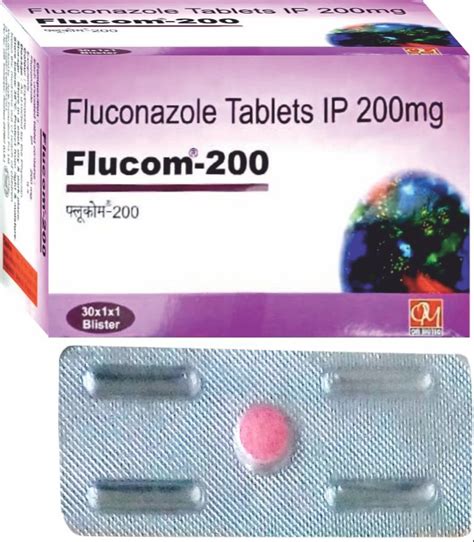Intro
Learn about Fluconazole 200mg Tablet, an antifungal medication treating fungal infections, candidiasis, and thrush, with information on dosage, side effects, and interactions.
The importance of understanding medication cannot be overstated, especially when it comes to treating fungal infections. One such medication that has gained widespread use is fluconazole, particularly in its 200mg tablet form. This antifungal drug is crucial for combating various fungal infections, and its effectiveness has made it a staple in many treatment regimens. For individuals prescribed fluconazole 200mg tablets, it's essential to grasp the basics of the medication, including its uses, side effects, and how it works. This knowledge not only empowers patients to manage their conditions better but also fosters a more informed dialogue between patients and healthcare providers.
Fluconazole's popularity stems from its broad spectrum of activity against fungi, making it versatile for treating infections ranging from superficial skin infections to life-threatening systemic fungal diseases. The 200mg dosage is particularly common, as it strikes a balance between efficacy and minimizing potential side effects. Understanding the nuances of fluconazole treatment, including dosage, administration, and potential interactions, is vital for maximizing its benefits while minimizing risks.
The mechanism of action of fluconazole involves inhibiting the synthesis of ergosterol, a critical component of fungal cell membranes. By disrupting this process, fluconazole effectively prevents the growth and proliferation of fungal cells, leading to their eventual death. This targeted approach reduces the risk of harming human cells, making fluconazole a preferred choice for treating fungal infections. As with any medication, however, fluconazole is not without its side effects, and patients should be aware of these potential risks to monitor their health effectively during treatment.
Introduction to Fluconazole 200mg Tablets

Uses of Fluconazole 200mg Tablets
The uses of fluconazole 200mg tablets are diverse, encompassing a range of fungal infections. Some of the most common indications include: - Vaginal candidiasis: Fluconazole is effective in treating vaginal yeast infections, providing relief from symptoms such as itching, burning, and abnormal discharge. - Oropharyngeal candidiasis: The drug is used to treat fungal infections of the mouth and throat, which can be particularly problematic in immunocompromised patients. - Esophageal candidiasis: Fluconazole is prescribed for the treatment of fungal infections in the esophagus, which can cause difficulty swallowing and chest pain. - Cryptococcal meningitis: This serious infection of the brain and spinal cord, caused by the Cryptococcus neoformans fungus, can be treated with fluconazole, especially in patients with HIV/AIDS.How Fluconazole 200mg Tablets Work

Benefits of Using Fluconazole 200mg Tablets
The benefits of fluconazole 200mg tablets are numerous, making them a preferred treatment option for many fungal infections. Some of the key advantages include: - Broad spectrum of activity: Fluconazole is effective against a wide range of fungal pathogens, including Candida, Cryptococcus, and Coccidioides species. - Oral administration: The drug can be taken orally, which is more convenient for patients compared to intravenous administration. - Good penetration into bodily tissues and fluids: Fluconazole achieves high concentrations in various body sites, including the cerebrospinal fluid, making it effective for treating systemic infections. - Relatively safe side effect profile: Compared to other antifungal drugs, fluconazole has a favorable safety profile, although it's not devoid of potential side effects.Side Effects of Fluconazole 200mg Tablets

Precautions and Interactions
When taking fluconazole 200mg tablets, patients should be aware of potential precautions and drug interactions. Some key considerations include: - Pregnancy and breastfeeding: Fluconazole should be used with caution in pregnant and breastfeeding women, as it may pose risks to the fetus or baby. - Liver and kidney function: Patients with liver or kidney disease may require dose adjustments, as fluconazole is metabolized by the liver and excreted by the kidneys. - Drug interactions: Fluconazole can interact with various medications, including warfarin, phenytoin, and rifampin, which may affect its efficacy or increase the risk of side effects.Dosage and Administration of Fluconazole 200mg Tablets

Resistant Fungal Infections
The emergence of resistant fungal infections is a growing concern, and fluconazole is no exception. Resistance can develop through various mechanisms, including alterations in the target enzyme, increased efflux of the drug, and modifications in the fungal cell membrane. To combat resistance, it's essential to use fluconazole judiciously, following established treatment guidelines and monitoring for signs of resistance.Conclusion and Future Perspectives

What is fluconazole used for?
+Fluconazole is used to treat various fungal infections, including vaginal candidiasis, oropharyngeal candidiasis, esophageal candidiasis, and cryptococcal meningitis.
How does fluconazole work?
+Fluconazole works by inhibiting the synthesis of ergosterol, a critical component of the fungal cell membrane, thereby preventing the growth and proliferation of fungal cells.
What are the common side effects of fluconazole?
+Common side effects of fluconazole include nausea, vomiting, diarrhea, abdominal pain, headache, and dizziness.
We invite you to share your thoughts and experiences with fluconazole 200mg tablets. Have you used this medication before? What were your experiences? Do you have any questions about fluconazole or fungal infections in general? Please feel free to comment below, and let's start a conversation about this important topic. Your input can help others better understand the role of fluconazole in treating fungal infections and promote a more informed discussion about healthcare.
